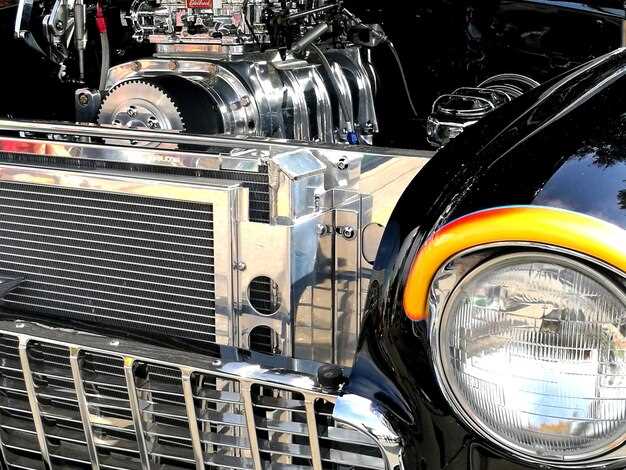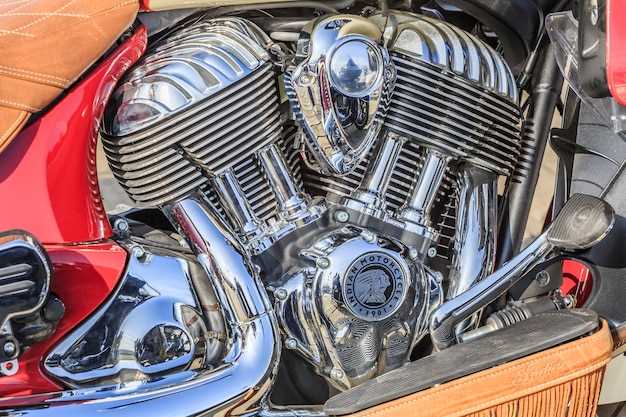
Classic muscle cars represent a significant era in automotive history, celebrated for their raw power and timeless designs. However, as modern fuel regulations and driving conditions evolve, many enthusiasts are considering EFI (Electronic Fuel Injection) conversions to enhance performance and efficiency. While these conversions promise improved fuel management and reliability, they also come with a set of challenges that classic muscle car owners must weigh.
One of the primary advantages of upgrading to EFI is the improvement in fuel efficiency. Modern EFI systems can precisely control the air-fuel mixture, leading to better combustion and reduced emissions. This means that classic muscle cars, often notorious for their thirst for fuel, can experience significantly improved mileage and performance. Additionally, EFI systems can offer better cold starting, smoother idle, and responsiveness compared to traditional carbureted setups.
However, despite these benefits, there are potential drawbacks to consider. The complexity of EFI systems can be daunting for some owners. Installation often requires significant modifications, including changes to the fuel system and wiring. Furthermore, maintaining an EFI system can necessitate specialized knowledge and tools, which may not be readily available to all classic car enthusiasts. Understanding these pros and cons is essential for anyone contemplating an EFI conversion for their beloved muscle car.
Understanding the Basics of EFI Systems

Electronic Fuel Injection (EFI) is a technology that replaces traditional carburetors in internal combustion engines, providing a more efficient and precise way to supply fuel to the engine. EFI systems use electronic controls to manage fuel delivery, improving performance, fuel economy, and emissions. These systems continuously monitor various engine parameters to optimize fuel-air mixture, ensuring a smoother and more responsive driving experience.
EFI systems can be broadly classified into two categories: Sequential Fuel Injection (SFI) and Batch Fire Injection. Each has its unique operational method, but both aim to improve efficiency and performance over traditional systems.
| EFI System Type | Description | Advantages |
|---|---|---|
| Sequential Fuel Injection (SFI) | Delivers fuel to each cylinder individually during the intake stroke. | Better atomization and fuel efficiency, improved throttle response. |
| Batch Fire Injection | Injects fuel into multiple cylinders simultaneously in batches. | Simpler design, easier to install, cost-effective. |
EFI systems leverage various sensors, including Maf sensors, oxygen sensors, and throttle position sensors, to monitor conditions and adjust fuel delivery accordingly. This real-time data processing enhances engine performance, reduces fuel wastage, and minimizes harmful emissions. With EFI, fuel atomization is improved, which leads to more complete combustion. This results in increased power output and better overall performance for classic muscle cars.
In summary, understanding EFI systems is crucial for evaluating the potential benefits they bring to classic muscle car restorations. The upgrade not only modernizes the vehicle but also significantly enhances its drivability and efficiency.
Benefits of Upgrading to EFI in Classic Muscle Cars
Upgrading to an EFI (Electronic Fuel Injection) system in classic muscle cars offers numerous advantages that enhance both performance and drivability. One of the primary benefits is improved fuel efficiency. EFI systems provide precise fuel metering, ensuring that the engine receives the optimal fuel-air mixture, which can result in better miles per gallon compared to traditional carbureted setups.
Another significant advantage is enhanced performance, especially in varying driving conditions. EFI systems adjust the fuel delivery based on real-time data from various sensors, allowing for quicker throttle response and increased horsepower. This capability is crucial for drivers seeking to maximize their vehicle’s potential on the road or track.
Reliability is also improved with EFI. Unlike carburetors, which can be sensitive to temperature changes and altitude variations, EFI systems maintain consistent performance under diverse conditions. This reliability translates to fewer breakdowns and a more enjoyable driving experience.
Furthermore, modern EFI systems often come equipped with diagnostic features. These systems can provide valuable data about engine performance and alert the owner to potential issues before they become serious problems, simplifying maintenance and repairs.
Finally, the environmental impact is another key benefit. EFI systems produce fewer emissions compared to traditional carburetors, making classic muscle cars friendlier to the environment while still delivering exhilarating performance. This aspect appeals to enthusiasts looking to preserve their classic vehicles for future generations.
Challenges and Limitations of EFI Conversions
Converting classic muscle cars to EFI can offer numerous advantages, but it also presents several challenges and limitations that enthusiasts should consider. One of the primary issues is the complexity of the installation process. Unlike traditional carburetors, EFI systems require precise calibration and setup, which can be daunting for those who lack experience with electronic fuel management.
Another significant challenge is the need for an adequate fuel delivery system. EFI systems typically require a high-pressure fuel pump, which may necessitate modifications to the fuel tank or lines. Additionally, using fuel injectors means that the existing fuel system must handle the increased pressures and flow rates, leading to potential further upgrades.
Moreover, integration of EFI components with older vehicles can lead to fitment issues. Many classic muscle cars were not designed with modern wiring and sensors in mind, making it essential to engineer solutions for mounting and routing wires. This can result in higher costs and extended project timelines.
From a performance standpoint, while EFI generally enhances drivability and fuel efficiency, tuning can be a limiting factor. Many older engines may not readily accept EFI without extensive modifications, and achieving the desired performance may require significant investment in new components or tuning expertise.
Finally, there is the psychological barrier for some enthusiasts. The tactile experience of tuning a carburetor is often seen as a rite of passage among classic car lovers. The transition to an EFI system might be met with resistance by purists who value the old-school mechanics of their vehicles.
In summary, while EFI conversions can modernize classic muscle cars and improve performance, the challenges associated with installation, compatibility, and the need for new fuel systems should not be underestimated.
Compatibility Issues with Classic Muscle Car Models

When considering EFI conversions for classic muscle cars, compatibility issues can significantly impact the implementation process. One major concern is the integration of modern fuel systems with older engine designs. Many classic muscle cars were originally equipped with carburetors, which operate differently from EFI systems. This difference often necessitates changes to fuel lines, fuel pumps, and even the tank to accommodate fuel injection pressure requirements.
Another compatibility challenge arises with the vehicle’s electrical system. Classic muscle cars typically feature outdated wiring harnesses that may not support the additional sensors and components required by EFI systems. Upgrading the electrical system is essential to ensure proper functioning of the new fuel management systems, which can add to the overall complexity and cost of the conversion.
Furthermore, the physical space under the hood can pose limitations. EFI components such as throttle bodies and injectors have dimensions that may not fit seamlessly within the engine bay of some classic models. This spatial challenge can sometimes necessitate custom fabrication or modifications to the vehicle’s existing structure.
Additionally, tuning and calibration of the EFI system require specialized knowledge. Classic muscle car owners may find it difficult to locate experienced technicians who are familiar with both the nuances of classic engines and modern EFI technology. Ensuring that the system is correctly calibrated for optimal performance is critical, as improper tuning can lead to issues such as poor fuel efficiency and engine misfires.
In summary, while EFI conversions can greatly enhance the performance and drivability of classic muscle cars, prospective owners should carefully evaluate compatibility with their specific model. Addressing fuel system integrations, electrical upgrades, spatial constraints, and tuning considerations are all vital steps in successfully implementing EFI technology in classic vehicles.
Cost Analysis: EFI Conversion vs. Carbureted Systems
When considering modifications for classic muscle cars, one of the key debates is whether to convert to an Electronic Fuel Injection (EFI) system or stick with traditional carbureted systems. Understanding the cost implications of each option is essential for informed decision-making.
Initial Investment
- EFI Conversion: The initial cost of converting to an EFI system can be significant. High-quality EFI kits typically range from $1,500 to $3,000, depending on the complexity and brand. This includes the cost of the fuel pump, injectors, wiring harness, and engine management system.
- Carbureted Systems: In contrast, installing a carburetor usually costs between $300 and $1,200. This lower price point makes carburetors more accessible for budget-conscious enthusiasts.
Installation Costs
- EFI Systems: Installation of an EFI system often requires professional help due to its complexity, which can add $500 to $1,500 in labor costs. Additionally, modifications to the fuel system and engine management may require specialized skills.
- Carbureted Systems: Carbs are generally easier to install, and many enthusiasts can perform the installation themselves, reducing overall costs. Labor rates can be minimal or nonexistent, particularly for DIY projects.
Maintenance Costs
- EFI Maintenance: While EFI systems may require less frequent tuning, they do have electronic components that can fail, leading to potential repair costs. Regular updates to engine maps might be needed to optimize performance.
- Carburetor Maintenance: Carburetors typically require more frequent adjustments and cleaning, especially if the vehicle is not driven regularly. Parts for carburetors are usually inexpensive, but the cumulative cost of maintenance can add up over time.
Fuel Efficiency and Long-Term Savings
- EFI Systems: One of the advantages of EFI is improved fuel efficiency. EFI systems can adjust air-fuel mixtures dynamically, resulting in better mileage and lower fuel costs over time.
- Carbureted Systems: Carburetors generally provide less fuel efficiency and can lead to increased fuel consumption. This may translate to higher long-term fuel costs, particularly for daily drivers.
Conclusion
In summary, while the initial investment in EFI conversions can be higher, the potential for improved fuel efficiency and reduced maintenance frequency may compensate for these costs over time. Carbureted systems may be cheaper upfront, but ongoing maintenance and higher fuel consumption can increase expenses in the long run. Enthusiasts should weigh these factors carefully based on their specific needs and budget constraints before making a decision.
Maintenance and Tuning Considerations for EFI Systems
Maintaining an EFI system in classic muscle cars requires attention to several key aspects to ensure optimal performance and longevity. Unlike carbureted systems, EFI relies on electronic components, which necessitate regular checks of wiring and connectors. Corrosion and loose connections can lead to performance issues, making it crucial to inspect these components periodically.
Fuel quality plays a significant role in the functioning of EFI systems. Using high-quality, ethanol-free fuel can prevent issues such as injector clogging and fuel system deterioration. Additionally, regular fuel filter replacements are essential to maintain clean fuel delivery, which directly affects engine performance and efficiency.
Tuning is another critical factor in maximizing the potential of an EFI system. Modern EFI setups often feature programmable ECUs that allow for adjustments to fuel maps, ignition timing, and other parameters. Engaging in regular tuning sessions, especially after modifications, can enhance performance and improve fuel economy. It is advisable to use tuning software compatible with your EFI system for effective adjustments.
When troubleshooting, monitoring engine parameters through logging software can provide valuable insights. Issues such as irregular fuel delivery or incorrect air-fuel ratios can often be diagnosed quickly through data analysis. This proactive approach helps in identifying problems before they escalate, ensuring the system remains in optimal condition.
Lastly, investing time in understanding the specific EFI system installed in your classic muscle car is crucial. Each system can have unique components and tuning requirements, so familiarizing yourself with the manual and seeking advice from experts can greatly assist in both maintenance and tuning endeavors.




